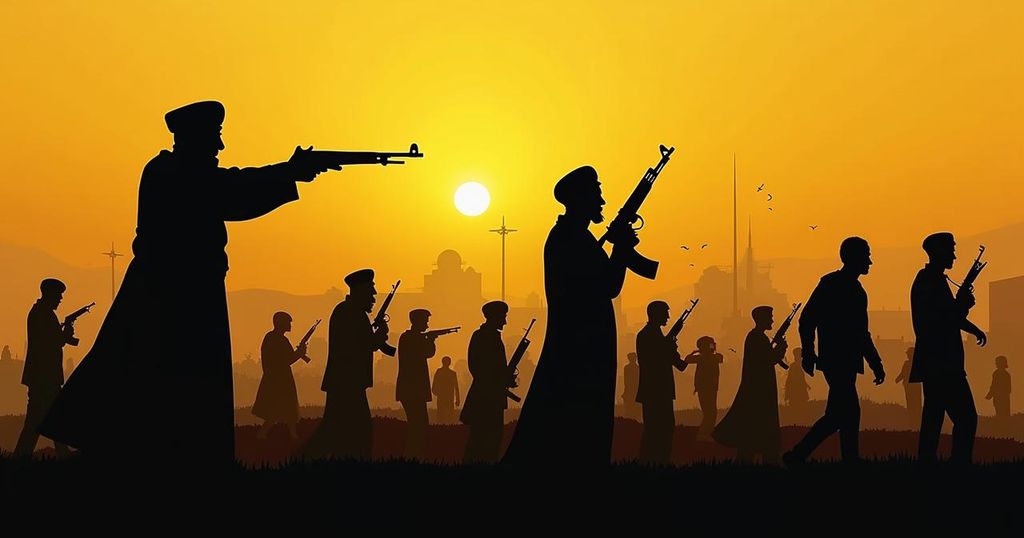Hezbollah leader Hassan Nasrallah was killed in an Israeli airstrike in Beirut, with significant reactions echoing across the Middle East. Israel conducted the strike as a decisive measure against Hezbollah’s command structure, which has faced intensified assaults in recent months. In contrast, leaders from Iran, Turkey, and several Arab nations condemned the assassination, leading to widespread mourning and calls for unity against Israel. The situation may escalate further amidst regional tensions as Hezbollah retaliated following Nasrallah’s death, raising concerns for broader conflict.
On Friday, Hezbollah leader Hassan Nasrallah was killed in an Israeli airstrike that targeted southern suburbs of Beirut. The assault involved approximately 80 bombs, including specialized “bunker-busting” munitions directed at Hezbollah’s headquarters, where Israeli intelligence indicated Nasrallah and senior officials were convening. This operation resulted in the deaths of at least 11 individuals and left 108 injured, according to Lebanon’s Health Ministry. Notably, the deputy commander of Iran’s Islamic Revolutionary Guard Corps, Abbas Nilforoushan, was also reported killed in the strikes, which have been characterized as a significant action against Hezbollah’s command structure by the Israeli military, marking it as a decisive phase in the ongoing conflict. Israeli Defense Minister Yoav Gallant stated, “The Israeli military carried out one of the most important countermeasures in the history of the State of Israel.” In immediate response, Iran’s Supreme Leader Ayatollah Ali Khamenei condemned the assassination, urging Muslim solidarity with Hezbollah against Israel. Khamenei remarked, “The fate of this region will be determined by the forces of resistance.” Hamas characterized the strike as a “cowardly act of terrorism,” expressing solidarity with both Hezbollah and Lebanon. Yemen’s Houthis echoed this sentiment, asserting that Nasrallah’s death would only amplify their resolve. Lebanon’s caretaker Prime Minister Najib Mikati announced a national period of mourning for Nasrallah, emphasizing the existential threats facing Lebanon. Former President Michel Aoun expressed deep sorrow over the loss of a leader committed to national resilience and liberation. He remarked, “I see that the dangers our country is witnessing as a result of the ongoing Israeli aggression require rising to the highest level of national solidarity that protects and fortifies our unity.” Turkish President Recep Tayyip Erdogan also condemned the actions of the Israeli government, claiming it is emboldened by foreign support amid its reckless behavior. Iraq and Syria have declared three days of national mourning, with Iraqi Prime Minister Mohammed Shia al-Sudani labeling the assassination as a “criminal act” that violated numerous boundaries. In contrast, social media footage revealed celebrations in rebel-held parts of Syria, where Hezbollah is viewed unfavorably due to their alliance with President Bashar al-Assad. From the U.S., President Joe Biden expressed that Nasrallah’s death represents a form of justice for his numerous victims, asserting America’s steadfast support for Israel’s right to self-defense against threats posed by Hezbollah. Vice President Kamala Harris echoed this sentiment, reiterating her commitment to Israel’s security and its right to combat Iranian-affiliated terrorist entities. Despite the potential for escalating tensions, Iran has indicated a preference for avoiding a larger conflict, with Hezbollah launching around 90 rockets into northern Israel in response to the airstrike that killed Nasrallah. Overall, the violence in Lebanon, exacerbated by the airstrikes and ongoing military operations, has led to over 700 reported deaths thus far.
The Middle East has witnessed significant repercussions following the death of Hezbollah leader Hassan Nasrallah, particularly given the group’s longstanding role in regional conflicts as a key Iranian proxy. The airstrike that led to his demise represents a critical escalation in Israeli operations targeting Hezbollah, which has endured extensive losses in recent months. Nasrallah’s leadership has been pivotal in shaping Hezbollah’s strategies and operations against Israel and other adversaries in the region. His assassination not only disrupts Hezbollah’s command structure but also ignites heightened tensions with Iran and its allied groups, further complicating an already volatile regional landscape. The Israeli response, framed as a decisive strike against terrorism, has drawn condemnation from various actors in the Middle East and has raised concerns about possible retaliatory measures from Iran and its affiliates.
The assassination of Hassan Nasrallah marks a pivotal moment in the ongoing conflict between Israel and Hezbollah, prompting reactions from various leaders and groups across the Middle East. The repercussions of this incident are vast, with potential implications for regional stability and the relationships among Iran, Hezbollah, and their adversaries. The declaration of mourning across several nations and the strong condemnations of Israel’s actions highlight the gravity of the situation and may foreshadow further escalations in violence. As responses and retaliations unfold, the international community watches closely, recognizing the potential for wider conflict arising from this significant event.
Original Source: www.al-monitor.com







